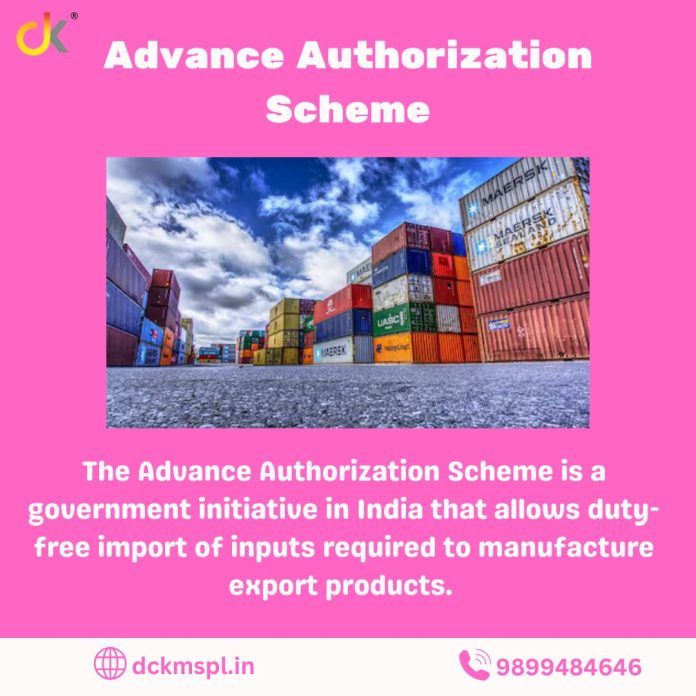The Advance Authorization Scheme (AAS) is a pivotal initiative introduced by the Government of India under the Foreign Trade Policy (FTP). This scheme is designed to promote exports by allowing duty-free import of inputs required for the production of export goods. It is particularly beneficial for industries that rely heavily on imported raw materials. This article delves into the key features, benefits, eligibility criteria, and the overall process involved in utilizing the Advance Authorization Scheme.
What is the Advance Authorization Scheme?
The Advance Authorization Scheme permits eligible exporters to import raw materials, components, and inputs without paying customs duties, provided these inputs are used to manufacture goods for export. This scheme is governed by the Directorate General of Foreign Trade (DGFT) and is an integral part of India’s efforts to enhance global trade competitiveness.
Key features of the scheme include:
- Duty-Free Imports: Importers can procure inputs without paying Basic Customs Duty (BCD), Additional Customs Duty (ACD), and Special Additional Duty (SAD).
- Export Obligation (EO): Exporters must fulfill an export obligation, ensuring that the imported goods are used solely for producing export goods.
- Validity Period: The authorization is valid for 12 months from the date of issuance, ensuring adequate time for importation and manufacturing.
- Applicable to Physical and Deemed Exports: The scheme covers both physical exports and deemed exports, such as supply to Export-Oriented Units (EOUs) or projects funded by international organizations.
Who Can Apply for the Advance Authorization Scheme?
The scheme is available to manufacturers and merchant exporters who meet the eligibility criteria. Here are the key qualifications:
- Export-Oriented Manufacturers: Entities directly involved in producing goods for export are eligible to apply.
- Merchant Exporters: Exporters who outsource production to manufacturers can also avail of the scheme, provided they fulfill the export obligation.
- Export Commitment: Applicants must have a clear and viable plan to meet the export obligation within the prescribed timeframe.
- Standard Input-Output Norms (SION): The inputs required for production must align with the Standard Input-Output Norms set by DGFT. If no predefined norms exist, exporters can apply for ad hoc norms.
Benefits of the Advance Authorization Scheme
The scheme provides several advantages that help exporters reduce costs and enhance profitability:
- Cost Reduction: Waiving customs duties on imported inputs lowers the overall cost of production.
- Competitive Edge: Lower production costs enable exporters to price their goods competitively in international markets.
- Flexibility in Sourcing: Exporters can source high-quality inputs globally without worrying about additional duties.
- Liquidity Management: By saving on customs duties, exporters can utilize funds for other operational requirements.
- Support for Deemed Exports: The scheme also benefits industries supplying goods domestically for projects that qualify as deemed exports, ensuring a wider reach.
Steps to Avail the Advance Authorization Scheme
To utilize the scheme effectively, applicants must follow these steps:
- Application Submission: Submit an online application through the DGFT portal, providing details such as the Bill of Materials (BOM), export product, and input requirements.
- Authorization Approval: Once the application is approved, DGFT issues the Advance Authorization.
- Import of Inputs: Import the required inputs duty-free within the validity period of the authorization.
- Fulfillment of Export Obligation: Manufacture and export the goods using the imported inputs within the specified timeframe.
- Submission of Proof: Submit necessary documentation, such as the Shipping Bill and Bank Realization Certificate (BRC), to DGFT to demonstrate compliance with the export obligation.
Documentation Required
Applicants must furnish accurate and complete documentation to avail of the scheme. Key documents include:
- Advance Authorization application form.
- Export Order/Letter of Credit.
- Input-Output Norms (SION) details or request for ad hoc norms.
- Undertaking to fulfill export obligations.
- Bank Guarantee or Letter of Undertaking, if required.
Challenges in Implementing the Scheme
While the Advance Authorization Scheme offers significant advantages, exporters may encounter challenges such as:
- Complex Documentation: The application process and compliance requirements can be intricate and time-consuming.
- Monitoring Export Obligation: Exporters must meticulously track and fulfill their export obligations within the stipulated timeframe.
- Penalties for Non-Compliance: Failure to meet obligations can result in penalties, including repayment of duties with interest.
- Fluctuating Norms: Changes in SION or delays in approval of ad hoc norms can impact planning and execution.
- Limited Awareness: Many small and medium enterprises (SMEs) may not fully understand the scheme’s benefits and requirements.
How to Overcome Challenges
Exporters can adopt the following strategies to address potential challenges:
- Seek Professional Assistance: Engage consultants or experts familiar with DGFT regulations and documentation.
- Leverage Technology: Use digital tools to streamline application processes and track export obligations.
- Regular Training: Conduct workshops for employees to stay updated on policy changes and compliance requirements.
- Proactive Communication: Maintain open lines of communication with DGFT and other regulatory bodies for timely updates.
Conclusion
The Advance Authorization Scheme is a powerful tool for exporters aiming to enhance their global competitiveness by reducing input costs. By enabling duty-free imports and offering flexibility in production and sourcing, the scheme plays a crucial role in bolstering India’s export economy. However, to maximize its benefits, exporters must stay informed, comply with all requirements, and address challenges proactively. For businesses looking to expand their global footprint, the Advance Authorization Scheme offers a pathway to growth and success in international markets.








